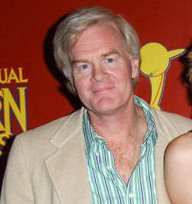David Weddle
| This page (like all pages on this wiki) was imported from the original English-language Battlestar Wiki based on what was available in the Wayback Machine in early 2017. You can see the archive of the original page here. |
| ||||
|---|---|---|---|---|

| ||||
| Role: | Writer | |||
| BSG Universe: | Re-imagined Series | |||
| Date of Birth: | ||||
| Date of Death: | ,
| |||
[{{{site}}} Official Site]
| ||||
| IMDb profile | ||||
David Weddle is a TV writer and producer who, before working on BSG, was best known for his work on Star Trek: Deep Space Nine. He is a supervising producer for the Re-imagined Series as of the fourth season.
Weddle is the son of a former Marine who fought in some of the bloodiest Pacific battles of World War II, such as Guadalcanal and Peleliu. [1]
While Weddle was growing up, his family was close to several members of the renown film director Sam Peckinpah's family, including his sister, Fern Lea (Peckinpah) Peter and her husband, and the director's son, Mathew Peckinpah. Later, through the son, Weddle met the famous father and watched him direct some of his last movie, The Osterman Weekend.
After Sam Peckinpah's death, Weddle used the director's thousands of production files and personal correspondence in possession of the Motion Picture Academy Library, as well as his contacts with family and friends, to write a major biography of the director.
After the book was published, Ira Steven Behr, the head writer and executive producer of Star Trek: Deep Space Nine -- and a major Peckinpah fan -- invited Weddle to lunch at Paramount and a tour the DS9 sets. The two became friends, and eventually Weddle asked Behr if he and his writing partner Bradley Thompson could pitch story ideas for the show.
Weddle had met Thompson in an acting class, where they discovered both attended the USC School of Cinema. Years later, Thompson asked Weddle if he could adapt Weddle's play "Memoirs of an Awkward Lover" into a screenplay. Weddle agreed, and the two ended up collaborating on the project together. But ultimately. nothing came of the adaptation.
Weddle and Thompson's first credited story for the series was was the fourth season episode "Rules of Engagement". The teleplay was written by Ronald D. Moore. Their first credited teleplay for Deep Space Nine was the fifth season episode "The Assignment".
The two continued to write for Deep Space Nine through its final season, writing two episodes from the final tightly-plotted nine-episode arc of the series.
Weddle has stated that his and Thompson's best script for DS9 was "Inquisition", which introduced an uncommonly dark element into the world of the generally utopian Star Trek -- namely, a covert black ops group known as "Section 31" which protects the Federation's interests using tactics that run counter to the noble philosophy and ideals of the organization.
Weddle also claims there are many references to Peckinpah and his films in their episodes for Battlestar Galactica.
Thompson and Weddle initially served as story editors on the first season of Battlestar Galactica. They became co-producers as of the second season. They were given more responsibility as producers for the third season. They became supervising producers for the fourth season.
While initially slated to write the "movie of the week" (later entitled "The Plan") with Thompson, the two had to subsequently withdraw from this assignment due to being hired as writers and supervising producers for CSI: Crime Scene Investigation, the popular, long-running CBS series.[2]
Weddle made an uncredited appearance as a patron of Joe's bar in the episode "Someone to Watch Over Me".
Writer credits for "Battlestar Galactica"
- Season 1:
- Season 2:
- Battlestar Galactica: The Resistance - A series of webisodes bridging the gap between Seasons 2 and 3
- Season 3:
- Season 4:
See also: Episodes written by David Weddle
External Links
- David Weddle article at Memory Alpha, the Star Trek wiki.
References
- ↑ Interview with David Weddle
- ↑ Hinman, Michael (4 July 2008). SyFy Portal: Writing Duo Finds 'CSI' After 'Battlestar' (backup available on Archive.org) (in ). Retrieved on 6 July 2008.